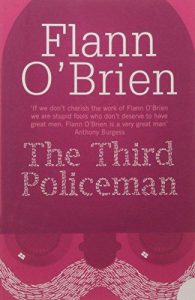 Flann O’Brien was one of the pen names of Brian O’Nolan, an Irish civil servant whose job forbid him from publishing. It was a general rule, not in any way intended to single our poor Brian, but if his paymasters had known exactly what he would write – the biting opinion pieces in The Irish Times, published under the sobriquet Myles na gCopaleen, or the absurdist novels that mocked interpretation – it might have been enforced more vigorously, and carried a sterner punishment. The Third Policeman was O’Brien’s second novel, but it was rejected by publishers, who wanted him to reign in his imagination, not unleash it, and so it did not appear until 1967, nearly 30 years after its completion and one year after O’Brien’s death. Its delayed appearance did nothing to blunt its reception or dampen its influence, and it has been delighting, puzzling and horrifying readers for half a century.
Flann O’Brien was one of the pen names of Brian O’Nolan, an Irish civil servant whose job forbid him from publishing. It was a general rule, not in any way intended to single our poor Brian, but if his paymasters had known exactly what he would write – the biting opinion pieces in The Irish Times, published under the sobriquet Myles na gCopaleen, or the absurdist novels that mocked interpretation – it might have been enforced more vigorously, and carried a sterner punishment. The Third Policeman was O’Brien’s second novel, but it was rejected by publishers, who wanted him to reign in his imagination, not unleash it, and so it did not appear until 1967, nearly 30 years after its completion and one year after O’Brien’s death. Its delayed appearance did nothing to blunt its reception or dampen its influence, and it has been delighting, puzzling and horrifying readers for half a century.
O’Brien is often and justifiably linked with Kafka, but it’s a comparison that simultaneously illuminates and obscures his merits. Kafka is overtly horrifying and subtly funny; O’Brien is openly humorous and secretly terrifying. In The Trial, Josef K. is menaced by forces he does not understand, and we as readers share his dread from the opening page. The humour – such as there is – lies in the absurdity of his situation, and what that reveals about the human condition. By contrast, The Third Policeman is comical from the introductory quotation, provided by the fictional philosopher De Selby:
Human existence being an hallucination containing in itself the secondary hallucination of day and night (the latter an insanitary condition of the atmosphere due to accretions of black air) it ill becomes any man of sense to be concerned at the illusory approach of the supreme hallucination known as death.
De Selby and his eccentric theories – from the belief that night is not an absence of light but the presence of toxic particles in the air, to the corresponding belief that sleep is brought on by our bodies reacting against this toxicity, and his attempts to “dilute water” – figure prominently in the book, and our narrator – the supposed rational center of the book – is a would-be De Selby scholar, so eager to publish his treatise on the man that he has murdered a wealthy local businessman for the funds he needs to complete his work. The effect of all this absurdity is to destabilize the reader, to put us off our guard, to lull us into enjoying the comic language and topsy-turvy world. After committing his murder, our narrator cannot locate his victim’s wealth, and so he seeks to enlist the local police in the search effort, claiming he has been robbed, but when they get wind of the murder, they lay the blame on him – not because they know he did it, but because it’s convenient to blame him. These two policemen are Sergeant Pluck and Policeman MacCruiskeen; the eponymous third policeman, Fox, is out trying to solve the theft of a bicycle, a bicycle which he himself has stolen, in order to give himself something to do. The policemen complete the novel’s absurdist theme, first by introducing the narrator to their “atomic theory of the bicycle,” according to which any two objects in contact long enough inevitably exchange atoms, becoming more like one another until, for example, a man and his bicycle become almost interchangeable:
The gross and net result of it is that people who spent most of their natural lives riding iron bicycles over the rocky roadsteads of this parish get their personalities mixed up with the personalities of their bicycle as a result of the interchanging of the atoms of each of them and you would be surprised at the number of people in these parts who nearly are half people and half bicycles.
O’Brien seems to be creating a world where, as one character puts it, “anything you do is a lie, and nothing that happens to you is true,” a world, in other words, without consequences, without any grounding in reality. In other words, an absurdist fantasy.
But by the novel’s end, he will pull the rug out from under his reader, revealing – or at least hinting at – the underlying logic to his drama. Our narrator, it seems, has been killed, and the world of the policemen – the absurd world – is a kind of limbo, a place he is doomed to experience and re-experience, a punishment for his misdeeds in life. The late revelation of our narrator’s death floods the novel with potential meaning. Are the three policemen somehow manifestations of the Christian trinity? Is De Selby, our narrator’s much-admired philosopher, a stand-in for the hyper-rationalism of materialist philosophy, which might blind its adherents as easily as it inspires them? This is indeed a funny novel, but the last laugh belongs to O’Brien.